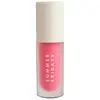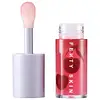What's inside
What's inside
 Key Ingredients
Key Ingredients

No key ingredients
 Benefits
Benefits

 Concerns
Concerns

 Ingredients Side-by-side
Ingredients Side-by-side

Hydrogenated Polyisobutene
EmollientHydrogenated Poly(C6-14 Olefin)
EmollientOctyldodecanol
EmollientEthylene/Propylene/Styrene Copolymer
Ricinus Communis Seed Oil
MaskingRosa Canina Fruit Oil
EmollientButyrospermum Parkii Oil
EmollientPersea Gratissima Oil
Skin ConditioningPrunus Armeniaca Kernel Oil
MaskingSimmondsia Chinensis Seed Oil
EmollientSqualane
EmollientVitis Vinifera Seed Oil
EmollientRubus Idaeus Seed Oil
EmollientCocoyl Hydrolyzed Collagen
CleansingTocopheryl Acetate
AntioxidantTocopherol
AntioxidantSiraitia Grosvenorii Fruit Extract
Skin ConditioningMenthoxypropanediol
MaskingCaprylyl Glycol
EmollientButylene/Ethylene/Styrene Copolymer
Pentaerythrityl Tetra-Di-T-Butyl Hydroxyhydrocinnamate
AntioxidantIron Oxides
CI 77492
Cosmetic ColorantCI 15850
Cosmetic ColorantCI 77891
Cosmetic ColorantCI 77499
Cosmetic ColorantCI 42090
Cosmetic ColorantHydrogenated Polyisobutene, Hydrogenated Poly(C6-14 Olefin), Octyldodecanol, Ethylene/Propylene/Styrene Copolymer, Ricinus Communis Seed Oil, Rosa Canina Fruit Oil, Butyrospermum Parkii Oil, Persea Gratissima Oil, Prunus Armeniaca Kernel Oil, Simmondsia Chinensis Seed Oil, Squalane, Vitis Vinifera Seed Oil, Rubus Idaeus Seed Oil, Cocoyl Hydrolyzed Collagen, Tocopheryl Acetate, Tocopherol, Siraitia Grosvenorii Fruit Extract, Menthoxypropanediol, Caprylyl Glycol, Butylene/Ethylene/Styrene Copolymer, Pentaerythrityl Tetra-Di-T-Butyl Hydroxyhydrocinnamate, Iron Oxides, CI 77492, CI 15850, CI 77891, CI 77499, CI 42090
Polyglyceryl-2 Triisostearate
EmulsifyingPolyglyceryl-2 Isostearate/Dimer Dilinoleate Copolymer
EmollientDiphenyl Dimethicone
EmollientSilica Dimethyl Silylate
EmollientPrunus Avium Seed Oil
EmollientSimmondsia Chinensis Seed Oil
EmollientDextrin Palmitate
EmulsifyingRosa Canina Fruit Oil
EmollientMalpighia Glabra Fruit Extract
Skin ConditioningPrunus Serotina Fruit Extract
MaskingRaphanus Sativus Root Extract
AstringentMaltodextrin
AbsorbentCitric Acid
BufferingWater
Skin ConditioningBenzyl Alcohol
PerfumingBenzyl Benzoate
AntimicrobialDehydroacetic Acid
PreservativeButylene Glycol
Humectant1,2-Hexanediol
Skin ConditioningAroma
Polyglyceryl-2 Triisostearate, Polyglyceryl-2 Isostearate/Dimer Dilinoleate Copolymer, Diphenyl Dimethicone, Silica Dimethyl Silylate, Prunus Avium Seed Oil, Simmondsia Chinensis Seed Oil, Dextrin Palmitate, Rosa Canina Fruit Oil, Malpighia Glabra Fruit Extract, Prunus Serotina Fruit Extract, Raphanus Sativus Root Extract, Maltodextrin, Citric Acid, Water, Benzyl Alcohol, Benzyl Benzoate, Dehydroacetic Acid, Butylene Glycol, 1,2-Hexanediol, Aroma
 Reviews
Reviews

Ingredients Explained
These ingredients are found in both products.
Ingredients higher up in an ingredient list are typically present in a larger amount.
Rosehip Oil is a non-fragrant plant oil. Rosehips are a fruit from a rose bush and are edible. This oil has skin conditioning and hydrating properties.
Rosehip contains Vitamin C, Vitamin E, fatty acids and linolenic acids. These nourish your skin barrier. Having hydrated skin may help reduce the appearance of fine-lines and wrinkles.
Another great component of Rosehip Oil is Vitamin A, or retinol. Vitamin A encourages your skin to create more collagen.
Rosehip oil may help with reducing pigmentation. The lycopene and beta-carotene have skin-lightening properties. However, more studies are needed to confirm this.
Learn more about Rosa Canina Fruit OilThis oil comes from the seeds of the desert shrub called Jojoba. It is more commonly known as jojoba oil, a non-comedogenic oil.
Jojoba oil does not contain fragrance and has many fatty-acids, making it a great soothing ingredient.
It also contains Vitamin E, a great moisturizing ingredient. Vitamin E is also an antioxidant and protects your skin against oxidative damage.
This ingredient humectant properties, meaning it helps draw moisture from the air. This helps keep your skin hydrated.
While jojoba has antibacterial properties, it is only able to kill some strains of bacteria.
Studies also show it helps in wound healing. In fact, Indigenous cultures have used jojoba as a moisturizer and to help treat burns for centuries.
Fun fact: Jojoba oil similar to natural human skin sebum, so it has a great effect on dry skin. It is also promising with helping to regulate sebum production.
Due to its fatty acid content, Jojoba oil may not be fungal acne safe. We recommend speaking with a professional if you have any concerns.
Learn more about Simmondsia Chinensis Seed Oil